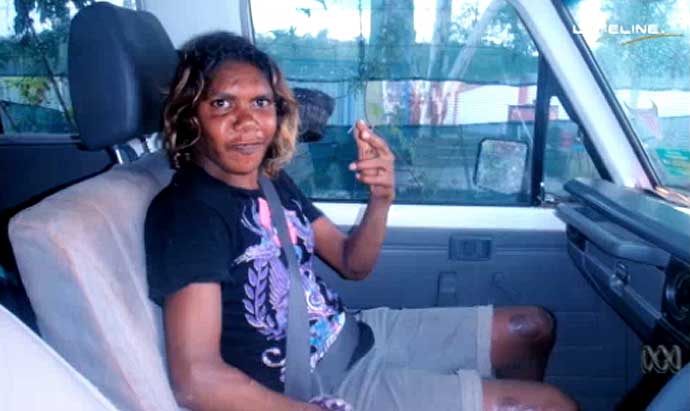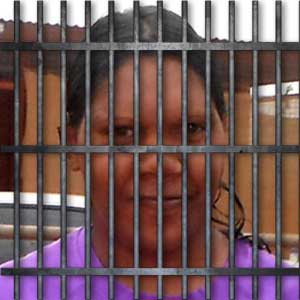Rosie Fulton to be freed after 21 months in jail with no conviction
Finally: Rosie Anne Fulton, a diagnosed intellectually impaired First Nations woman who has been held in a West Australian jail without trial or conviction for 21 months, is to be moved to Alice Springs to be closer to her family.

ABC John Stewart 25 June 2014
A mentally impaired Aboriginal woman who has been held in jail without trial or conviction for 21 months will be released next week to be closer to her family.
Rosie Fulton, 24, will be transferred from Kalgoorlie Prison in Western Australia to Alice Springs, where she will live in a house managed by staff from the Department of Health.
About 120,000 Australians signed a petition to have Ms Fulton freed after her story was broadcast on the ABC's Lateline program in March.
"I'm delighted that she's finally going to be out of jail after 21 months, and of course she is also ecstatic about the idea of coming back to Alice Springs and being able to contact her siblings. It's a really good outcome," Ms Fulton's legal guardian Ian McKinlay said.
In 2012, Ms Fulton was arrested after crashing a stolen car. A magistrate declared her unfit to stand trial and sent her to jail because there was no alternative accommodation available in Western Australia.
A psychiatric report found she had foetal alcohol syndrome (FAS) and had the mental age of a young child.
Mr McKinlay says Ms Fulton will be living in a suburban house with a community-based support model and will be provided with around-the-clock support.
ABC Lateline Report - 25 June 2014
Aboriginal leaders warn of more FAS cases in courts
Aboriginal leaders have welcomed Ms Fulton's release but warn more Indigenous children with FAS may soon come into contact with courts and prisons.
"We are going to see a wave of kids come through suffering from FASD (foetal alcohol spectrum disorder) and have this brain injury," Aboriginal and Torres Strait Islander Social Justice Commissioner Mick Gooda said.
"It affects them in a way that they can't communicate and learn the way the rest of us learn and they are just wired differently to us."
Mr Gooda said good work was being done in some Indigenous communities throughout Australia to deal with foetal alcohol syndrome and teach women not to drink during pregnancy.
However, he said that Ms Fulton may be the first of many cases which the police and courts have to deal with.
"We've got to start training our professionals - like the police, like the teachers and people in the health field. These are the kids that need to be dealt with differently," he said.
Call for audit of prisoners held with no conviction
There is no official record of the total number of mentally impaired prisoners held in Australian jails who have been deemed not fit to plead due to different state and territory prison systems.
Aboriginal Disability Justice Campaign spokesman Patrick McGee said up to 30 people with "some kind of cognitive impairment" would be detained in prisons without conviction per year.
Prison authorities in Western Australia said there were nine mentally impaired prisoners being held in their jails without conviction.
The Northern Territory Department of Health said 10 prisoners were being held without conviction.
Three are living in the Alice Springs secure care facility which was purpose built for the mentally impaired, while two other prisoners are undergoing a transition program to live in the Alice Springs centre.
The Aboriginal Disability Justice Campaign does not know how many prisoners in Queensland and other states are held without conviction.
La Trobe University professor Patrick Keyzer said the Federal Government needed to conduct a national audit of prison systems and fund facilities for impaired people to live outside of jail.
"The Federal Government really needs to take this issue seriously and sit down with the states and territories and develop a lasting solution," he said.
"It's outrageous that in a country like Australia, Aboriginal people are in prison when they have not been found guilty of a crime.
"Those people should not be in prison - they should be in a secure setting if that is necessary. Otherwise they should be supported in the community."
Professor Keyzer said in many cases people who were considered by the courts to be unfit to plead end up spending a long time in jail.
"They are staying in prison for a lot longer than they would have if they had actually been found guilty of the crime and sentenced," he said.
ABC Lateline Transcript
TONY JONES, PRESENTER:
Three months ago we brought you the story of Rosie Fulton, a mentally-impaired Aboriginal woman being held in a West Australian jail without trial or conviction.The 24-year-old is a victim of foetal alcohol syndrome and was jailed after a magistrate declared her not fit to plead.
Well next week, after a public outcry following our story, Rosie Fulton will be moved to Alice Springs to be closer to her family.
But Aboriginal leaders fear that hers is just the forerunner of a wave of cases involving children who are growing up with foetal alcohol syndrome.

John Stewart reports.
JOHN STEWART, REPORTER: Rosie Fulton has spent 21 months in this prison near the West Australian town of Kalgoorlie with no conviction.
In 2012, she was arrested after crashing a stolen car. A psychiatric report found she suffered from foetal alcohol syndrome and was mentally impaired.
The magistrate declared her unfit to stand trial and sent her to jail because there was no alternative accommodation.
Next week Rosie Fulton will be moved to Alice Springs to be closer to her family.
IAN MCKINLAY, LEGAL GUARDIAN: I'm delighted that she's finally going to be out of jail after 21 months there and of course she's also ecstatic about the idea of coming back to Alice Springs and to be able to contact her siblings. So, yeah, it's a really good outcome.
JOHN STEWART: Ian McKinlay is Rosie Fulton's legal guardian. He's run a long campaign to get her out of jail. More than 120,000 Australians backed a petition to have her realised from prison into community care.
IAN MCKINLAY: It'll be a community-based support model in which she'll just live in a suburban house and will be provided 24-7 support.
JOHN STEWART: But while Rosie Fulton is finally getting the support she needs, other mentally-impaired prisoners are still being held in jails.
In Western Australia, mentally-impaired Aboriginal man Marlon Noble spent more than 10 years in jail with no conviction.
There are currently nine cases in WA prisons and 10 in Northern Territory jails. Disability groups estimate there are 30 cases nation-wide.
Professor Patrick Keyzer from La Trobe University is calling on the Federal Government to conduct a national audit of all state and territory prisons and fund community accommodation for impaired prisoners who are not fit to plead.
PATRICK KEYZER, LA TROBE UNIVERSITY: They're staying in prison for a lot longer than they would have if they'd actually been found guilty of the crime and sentenced. Now that's just an outrage and it's unbelievable that this going on in Australia and it needs to be stopped and we need a national solution as a matter of urgency.
JOHN STEWART: The Northern Territory Government has built a secure care building in Alice Springs to house mentally-impaired prisoners outside jail, but so far, only men have been allowed to stay in the centre.
In Western Australia, two similar facilities will be built over the next 18 months. But there are concerns that a large number of Indigenous children with foetal alcohol syndrome will soon come into contact with police and the courts.
MICK GOODA, ABORIGINAL TORRES STRAIT ISLANDER SOC. JUSTICE COMMISSIONER: We're going to see a wave of kids come through suffering FASD and have this brain injury that doesn't actually - it affects them in a way that they can't communicate, they can't learn this way the rest of us learn; in the vernacular, they're just wired differently to us. We've got to start training our professionals like the police, like the teachers, like people working in the health field that these are kids that need to be dealt with differently. They're not - they can't put - see one scenario and another scenario and put them together and come to a conclusion like we do. I think it's - unless we find out how to deal with that, we're going to see a wave of these kids ending up in the legal system, and if they get the same treatment as Rosie, as Marlon, who knows how long they're going to be in this limbo?
JOHN STEWART: Rosie Fulton spent 21 months in jail because governments couldn't find a place for her to stay. Now at least she has a chance to live in the community near her family.
John Stewart, Lateline.

